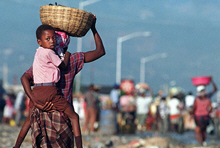
Typical street scene in Santa Ana, El Salvador. (Photo: iStock)
IMF Survey: IMF Approves $1.2 Billion in Debt Relief for Haiti
July 1, 2009
- Government will save over $50 million a year for ten years
- Authorities approve governance reforms and increase social spending
- Goal will be to lock in gains through sound fiscal policy
The IMF Executive Board granted Haiti $1.2 billion in debt relief, freeing up money for the government to spend on health, education, and fighting poverty, the institution announced on June 30.

Haiti’s debt relief savings will be spent on health, education, and fighting poverty (photo: Carl Juste/Miami Herald)
Low-Income Countries
The relief was granted as part of the Enhanced Heavily Indebted Poor Countries Initiative, a joint program between the Fund and the World Bank’s International Development Association.
“To reach this point is a key milestone, and the authorities are to be commended for this important achievement amid severe external shocks,” said Corinne Deléchat, mission chief for Haiti in the Fund’s Western Hemisphere Department.
Haiti carried out a number of reforms as part of the debt relief process that have strengthened government accountability and improved basic social services. The country has also shown good performance under the IMF’s Poverty Reduction and Growth Facility (PRGF), a lending program to low-income countries, and is seeing gains from its poverty reduction strategy. In particular, Haiti has
• Adopted a law on public procurement
• Required public officials to declare their assets
• Instituted auditing and publication of government accounts
• Set up a financial plan to allow over 50,000 more children to attend school
• Put in place a teacher training program
• Increased vaccination rates
• Approved an HIV/AIDS prevention and treatment plan.
Changes key to mitigate risks
The reforms were designed to create a more stable economy and to begin carrying out a national poverty reduction strategy.
These aims were accomplished despite a number of setbacks, including food and fuel price riots and four back-to-back hurricanes in 2008, followed by the effects of the global economic crisis.
Haiti is the 26th country to receive debt relief under the IMF and World Bank initiative, and the final eligible country in the Americas to reach this milestone.
Risks to Haiti’s economic stability remain, particularly from external shocks, and the country will need to make the most of debt relief with careful fiscal policy, while increasing domestic revenue and improving the quality of public spending.
At a donors conference for Haiti held in April in Washington, D.C., IMF Managing Director Dominique Strauss-Kahn said the Fund would continue to play its part in helping Haiti with macroeconomic policy advice and technical assistance.
Separately, the IMF Executive Board also approved further financial assistance to Haiti under the PRGF. In the past year, the IMF increased its financial support to Haiti twice to help the country cope with the impact of rising food and fuel prices, a series of severe hurricanes, and the global economic crisis.
An immediate payment of $24.5 million under the three-year PRGF brings the total of IMF assistance to Haiti to roughly $178 million since 2006. The Board also approved an extension of the lending arrangement through the end of January 2010.
Comments on this article should be sent to imfsurvey@imf.org


